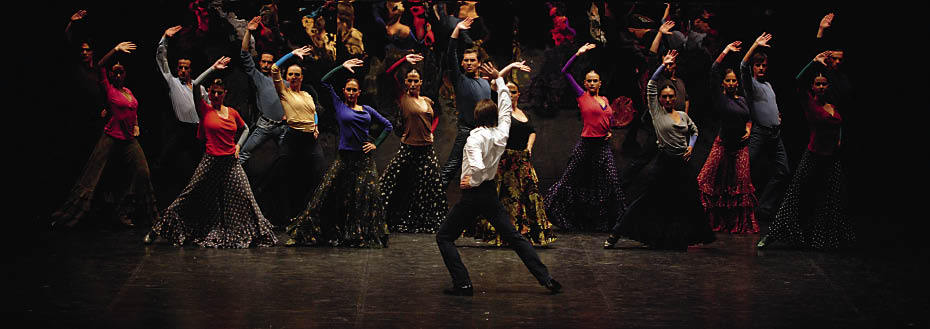Verdi’s Requiem
Royal Opera House
Carmen
Sadler’s Wells
Every time there’s a performance of Verdi’s Requiem the issue of whether it is a liturgical or theatrical work gets solemnly discussed, as if it couldn’t be both. If you take the Creator to be the figure described or invoked in the Bible, then He clearly has a taste for highly dramatic effects. As Auden put it, ‘When God said “Let there be Light” He must have realised that He was being extraordinarily pretentious,’ and the promise that the Day of Judgment will be heralded by trumpets indicates a thoroughly operatic imagination. It’s rather surprising that fewer composers haven’t risen to the occasion, and have tended to go in for the insipidities of consolation when they could have been trying their best, like Verdi and Berlioz, to emulate the terrors of Michelangelo’s ‘Last Judgment’. If there is a criticism to be made of what I think is easily Verdi’s greatest work, it is that he prefers thrilling us to frightening us. Certainly, the performance that was given in the Royal Opera House last week was much more exciting than it was alarming, with brass players stationed in the circle; it’s only a pity that closed-circuit TV obviates the necessity for the conductor to whip round and bring in the various far-flung groups, which used to be such a quintessentially Italian gesture: the conductor as God’s deputy for the duration of the Requiem.
Antonio Pappano, as was to be expected, conducted a performance of dynamic extremes, the chorus nearly inaudible at the start, and as almost always well below tempo markings. When the tenor soloist Piotr Beczala vaulted in with his ‘Kyrie eleison’ the effect was exhilarating rather than supplicatory, but then it’s hard to see how it can be otherwise, with the other soloists hot in pursuit. The bass Ildar Abdrazakov was stunning, with some of the finest Slavic bottom notes I have heard for years. Olga Borodina, who has recently been conspicuous for her cancellations, was in her most implacable form, but also, in a strange way, extremely moving, as an impersonal pleader, speaking for humanity rather than for herself. Barbara Frittoli was the absentee (one can list Verdi Requiems by which soloist was indisposed) and Micaela Carosi sang instead. Unsteady and tentative for much of the performance, she came into her own in the ‘Libera me’, where, exactly the opposite of Borodina, she was panic-stricken, an individual in flight from wrath, and then serene in the a capella section. The contrast between them was the most striking I have heard.
At Sadler’s Wells there has been a flamenco festival, and I went along to see how the Antonio Gades Company would treat a version of Carmen that originated in 1983, when competing or complementary versions of this modern myth were all the rage. Gades was inspired by Carlos Saura’s memorable film, and became yet another Spaniard feeling the need to rectify Merimée’s and Bizet’s shortcomings. He used some of Bizet’s music, but not much. In this performance, the Decca recording with Regina Resnik and Mario del Monaco was used, never a major addition to Carmen’s discography. Don José only sang, in fact, in the last minutes of pleading and threatening, and one had to concentrate hard on the stage not to be diverted, in several senses, by del Monaco’s French. The marriage of Bizet and flamenco is not a happy one, but the work is brief enough, the whole thing only 80 minutes, for the mismatch not to lead to a divorce.
After the exhilarating Bizet Prelude, or half of it, we had dancers heel-clicking to guitar accompaniment, moving slowly from back to front of the stage, then back again, which excited the audience a good deal. Carmen was danced by Stella Arauzo, a mature but supple figure, while Adrián Galia made a more positive character of José than one normally gets in the opera. Besides the preening Toreador of Jairo Rodriguez there was another figure, the Husband, whose role in the action was unclear. There is a certain amount, not much, of Spanish singing too. As the piece progressed I found myself enjoying it more than I could have anticipated, even though the bleaker side of Bizet’s score, above all the Card Song and the invocations of Fate, is largely neglected — or perhaps I missed out on some of those scowls that flamenco dancers are so adept at producing. To say, as the programme does, that ‘The two versions are now inseparable’ is clearly false. Bizet’s leads as vigorous an independent life as it ever did, while the varying Spanish versions remain marginal. There’s nothing like creating an ill-defined, lightly sketched character and then carrying on about what her (or less often, his) ‘mystery’ is. Carmen is a character of whom you make what you want, and has no essence. But that won’t stop people looking for one.






Comments